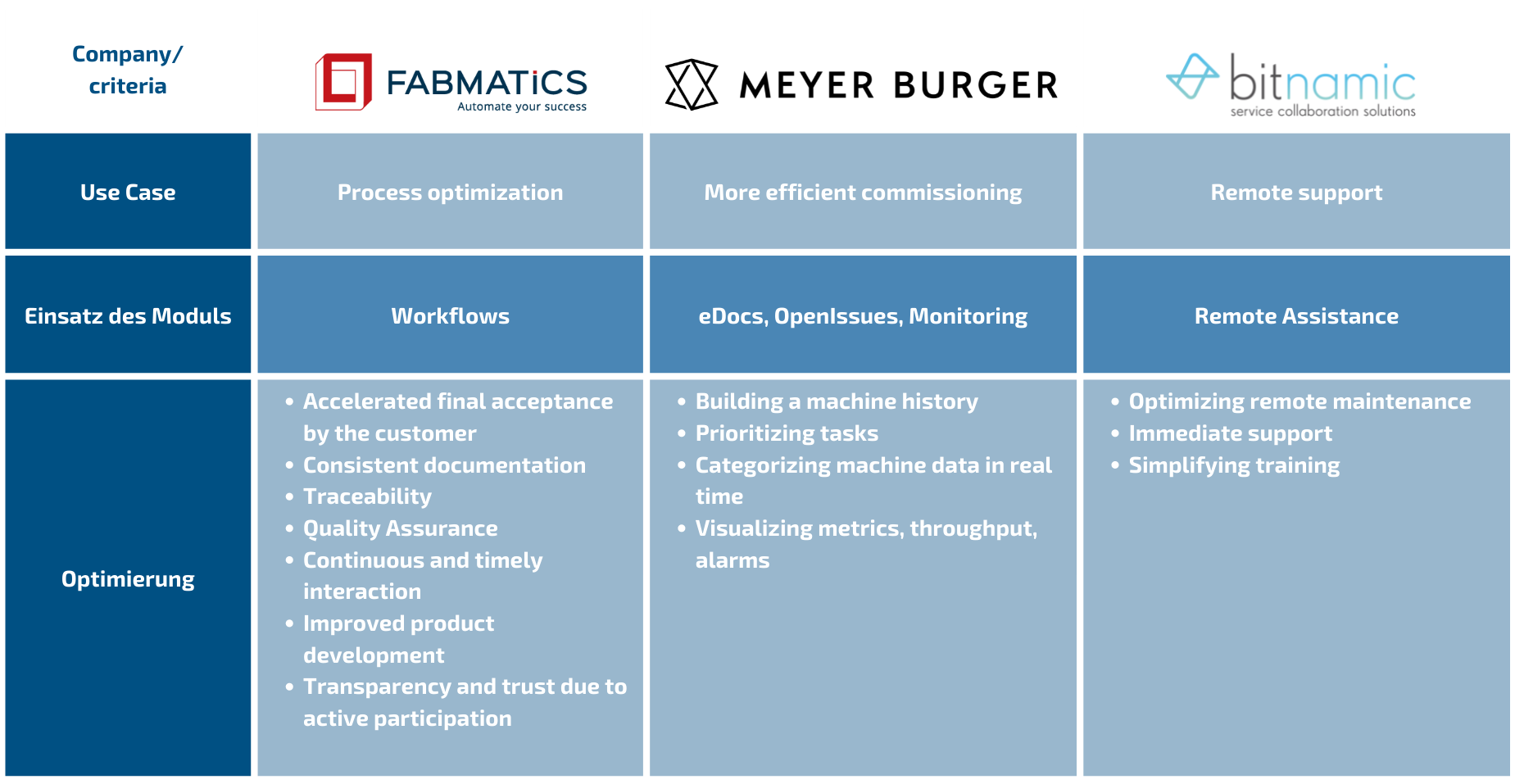1st Online workshop: Service in transition — inputs for real-life scenarios
“As a service” business models have become more established than ever, not only in everyday life but also increasingly in the industrial sector. Services are rapidly gaining in importance and represent the actual added value that the product alone cannot deliver to users. Services are no longer purchased but are rented on a temporary basis as long as the service is relevant to the company.
Even medium-sized mechanical engineering companies are increasingly realizing that services offer high growth potential and are increasingly in demand by customers.
In the online workshop “Service & After-Sales — Increasing Potential in Mechanical Engineering”, the 12 company representatives from the mechanical engineering sector also shared this point of view. The first extended services, such as remote service or maintenance sales, are already in the early stages of implementation at the companies. Value-added services such as an overview of machine efficiency and availability or business models by output often fail, however, due to the valid data quality and evaluation required for this. In the workshop, representatives from the mechanical engineering sector also reported a lack of response speed in service cases and growing customer dissatisfaction as a result.
Legal aspects and the correct handling of data when establishing data-based services also raise questions and uncertainties. Mr. Kamp from BIZ | LAW Rechtsanwälte in Dresden classified the machine data for this purpose and formulated strategies on how to make best use of the flexible design and opportunities. Mechanical engineers are required to actively shape their data management and to create trust through transparent processing.
The EquipmentCloud® is the right service solution for this:
- Supports the establishment of services throughout the entire machine life cycle with use-case-related functionalities
- Provides the highest level of technical data security and integrity
- Transparent and clearly understandable terms of use
Various best practice examples have shown that service usage scenarios can be very diverse. It also became clear that the enormous growth potential of services based on data can only be exploited if service is made a top priority, service business models are established and sales, service and customers work together more closely and cooperatively.
2nd Online workshop: Monitoring and machine integration with digital service solutions
What would it be like if machines, systems, and also employees, were fully utilized at all times and production processes had not to face any unplanned downtimes? In other words, the reasons for downtimes could be clearly identified so that the performance of the machine is never in question, and instead operator errors or any other weak points are signaled, streamlining performance over the long term.
What is required for this is data that is collected efficiently and processed in a way that data analysis during the next step is possible without too much effort.
In the second part of the workshop series, representatives from six mechanical engineering companies discussed the goals and added value they expect from monitoring machine data:
Two ways of integrating machines into the digital transformation solution
In the second part of the workshop, two solutions were shown in detail, depending on the form in which the data is available, either digitally, or locally. The necessary tools and the procedure for data and machine integration in conjunction with the EquipmentCloud® digital transformation solution were illustrated using two examples.
This made it clear to participants that data integration can be implemented flexibly and easily regardless of the control system or existing interface used. The EquipmentCloud® monitoring app, the RESTful APIs and the IoT gateways represent the necessary modules. However, real added value is only generated when the data is regularly analyzed and further processed. Predictive maintenance is the long-term goal. However, condition monitoring or preventive monitoring are the first steps to being able to correctly classify your data. For this purpose, it is important to create a reliable database using automated data integration.
3rd Online workshop: Best Practices
Nowadays, digitally supported commissioning is no longer an optional feature for the technical team. Instead, it is an absolute necessity to install and repair machines and systems worldwide and to be able to continue to guarantee contractual acceptance criteria on time.
End customer expectations are very high, especially in the semiconductor industry, and machine manufacturers need to deliver exceptional performance. Delays cost money and this is usually exclusively at the expense of the machine manufacturer.
Improve communication within the team and with the customer, speed up the commissioning process and make transparency a key criterion: How this works was shown using the example of three successful customer projects:


